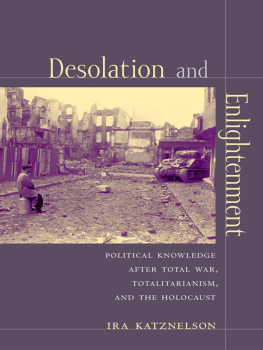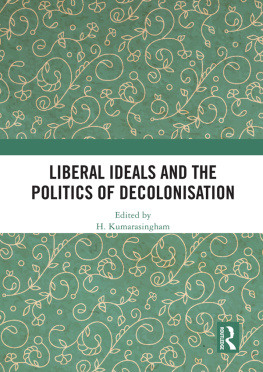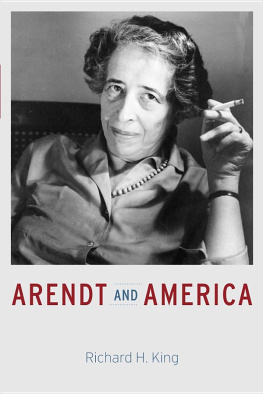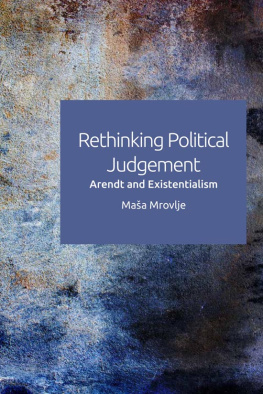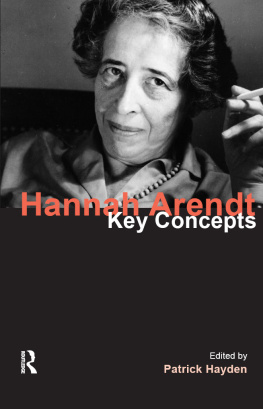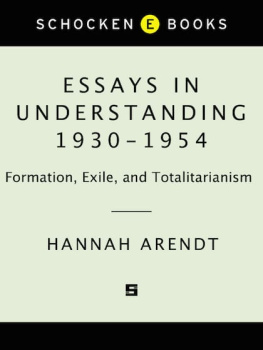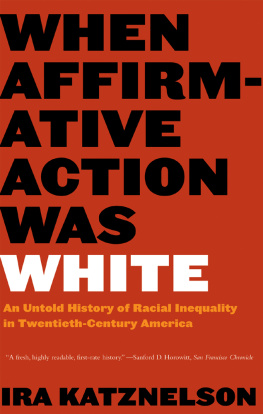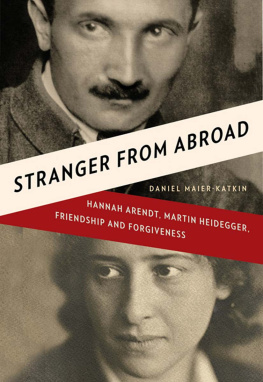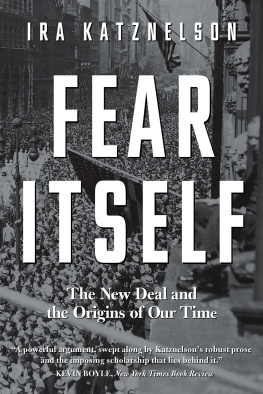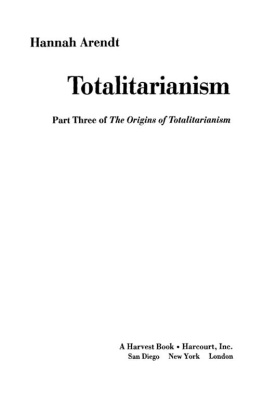Desolation and Enlightenment
THE LEONARD HASTINGS SCHOFF MEMORIAL LECTURES

Columbia University Press
Publishers Since 1893
New York, Chichester, West Sussex
cup.columbia.edu
Copyright 2003 Columbia University Press
All rights reserved
E-ISBN 978-0-231-50742-4
Library of Congress Cataloging-in-Publication Data
Katznelson, Ira.
Desolation and enlightenment : political knowledge after total war, totalitiarianism, and the Holocaust / Ira Katznelson.
p. cm.
Includes bibliographical references and index.
ISBN 0231111940
1. Political sciencePhilosophy. 2. Human behaviorPhilosophy. 3. Political psychology. 4. Political sociology. 5. World politics19451989. 6. War (Philosophy). 7. International relationsPhilosophy. 8. Holocaust, Jewish (19391945). 9. JewsPublic opinionHistory. I. Title.
JA71 .K35 2002
301.01dc21 200231579
A Columbia University Press E-book.
CUP would be pleased to hear about your reading experience with this e-book at .
Illustration:
El sueo de la razn produce monstruos.
(The Sleep of Reason Produces Monsters).
Los caprichos, plate 43.
Photo courtesy of Museo del Prado
For Emma,
who grows as she runs

UNIVERSITY SEMINARS
Leonard Hastings Schoff Memorial Lectures
The University Seminars at Columbia University sponsor an annual series of lectures, with the support of the Leonard Hastings Schoff and Suzanne Levick Schoff Memorial Fund. A member of the Columbia faculty is invited to deliver before a general audience three lectures on a topic of his or her choosing. Columbia University Press publishes the lectures.
DAVID CANNADINE
The Rise and Fall of Class in Britain
1993
CHARLES LARMORE
The Romantic Legacy
1994
SASKIA SASSEN
Sovereignty Transformed: States and the New Transnational Actors
1995
ROBERT POLLACK
The Faith of Biology and the Biology of Faith: Order, Meaning, and Free Will in Modern Medical Science
2000
Originally intended by Goya for the frontispiece of his Los caprichos, The Sleep of Reason Produces Monsters is the most famous image in this series of etchings. In sleep, the body is dark, Walter Benjamin explained to Gershom Scholem, a spectral medium, in the middle of which life and death are located. Goya portrays how, in sleep, demons can haunt reason. This is a book about reason and four decades of its sleep, with cruel and hideous monsters on the loose. It also is an injunctive book about history, social science, and liberal guardianship I offer in critical homage to the generation of my teachers who, in a climate of anxiety, sought to rouse reason and secure its wakefulness.
***
I wrote Desolation and Enlightenment before the shattering of lives and cityscapes on September 11, 2001. Some friends have urged me to rewrite sections to underscore its additional pertinence, counseling that the intellectual efforts I discuss by postwar scholars to map the origins of dark times and discern the character of the modern state resonate with themes familiar today. I have decided otherwise. Rather than rework the book to force this relevance, I prefer to leave any such discovery to its readers.
I begin my acknowledgments with a statement of debt to George Steiners In Bluebeards Castle and to Lionel Trillings essay, Elements that are Wanted, concerned with the politics of T.S. Eliot. I read Steiner shortly after I had been invited to offer Columbia Universitys 199798 Leonard Hastings Schoff Memorial Lectures, the basis for this book. Steiners fierce volume provided my initial impetus. I defined my subjectpolitical knowledge after total war, totalitarianism, the holocaustin part as an effort to determine why I had been disappointed by his customarily brilliant effort to understand the impact on the Wests tradition of Enlightenment on what he called Europes 19141945 season in hell. Later, I came across Trillings piece as I set out on my last round of revision. His writing reminded me that the boundaries between liberal and illiberal thought are not nearly as crisp as we might like and that the endowments of the liberal tradition depend on its capacity to engage with values and beliefs that are not easily compatible with its own temperament.
Bluebeards Castle is based on the T.S. Eliot Memorial Lectures Steiner delivered at the University of Kent at Canterbury in March 1971. The subtitle he selected, Some Notes Toward the Redefinition of Culture, refers to Notes Toward the Definition of Culture, a powerful collection of essays Eliot had written mainly in 1945 and 1946. That volume, Steiner reproached, is not an attractive book. One that is gray with the shock of recent barbarism, but a barbarism whose actual sources and forms the argument leaves fastidiously vague.
an analysis of the idea and ideal of culture demands the fullest possible understanding of the phenomenology of mass murder as it took place in Europe. The failure of Eliots Notes Toward the Definition of Culture to face the issue, indeed to allude to it in anything but an oddly condescending footnote, is acutely disturbing.
Eliots Notes had argued the Wests cultural frailty and deterioration had been advanced not by fascism or war but by democracy, equality, secularization, the corrosion of aristocracy, and the erosion of piety, all of which he identified primarily with the Enlightenment. A preacher of ethical regeneration, Eliot also hearkened to the familiar trope of the Jew as the antithesis of an authentic Christian Europe, though only with a lone specific mention and without direct reference to the prior decades of European spoliation. Advancing the claim that the closer it comes to being a thoroughly homogeneous really Christian society, the more the culture of Europe can warrant its status as the highest culture the world has ever known, he asserted that cultural and demographic pluralism constitute a profound danger to advanced culture; hence he judged the United States to be a country unfortunately swollen [by] that stream of mixed immigration.
Not just Steiners fiery rejoinder but his quite metaphysical explanation for the European crisis helped direct my attention to an alternative pathway mapped by a group of postwar thinkers in the United States who had turned to the social sciences and history in an effort to deepen and guard the tradition of Enlightenment. Seeking to come to terms with Europes recent catastrophe and comprehend the character and capacities of the modern state at just the moment Eliot was composing his Notes, they provided a more appealing set of possibilities. I found myself drawn toward their work just as I was grappling with why I had been disappointed by Steiners compound of Freudianism and literary critique.
Like Eliot, Steiner underscored the outsider status of Europes Jews. Their religions summons to perfection, in the forms of Old Testament monotheism, primitive Christianity, and messianic Socialism, he argued, had been imposed on the current and currency of Western life. This pressure had built up in the social subconscious murderous resentments.
the genocide that took place in Europe and the Soviet Union during the period 193645 (Soviet anti-Semitism being perhaps the most paradoxical expression of the hatred which reality fells toward failed utopia), [to have been] far more than a political tactic, an eruption of lower middle-class malaise, or a product of declining capitalism. It was not a mere secular, socio-economic phenomenon. It enacted a suicidal impulse in Western civilization. It was an attempt to level the futureor, more precisely, to make history commensurate with the natural savageries, intellectual torpor, and material instincts of unextended man. Using theological metaphors one may say that the holocaust marks a second Fall. We can interpret it as a voluntary exit from the Garden and a programmatic attempt to burn the Garden behind us.
Next page
